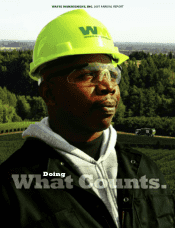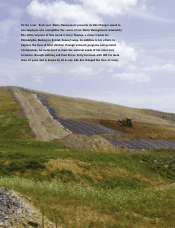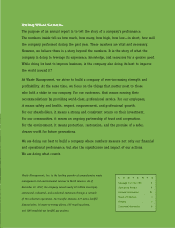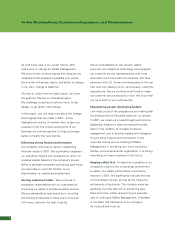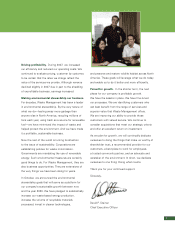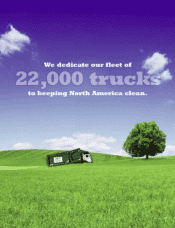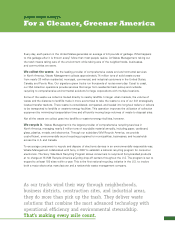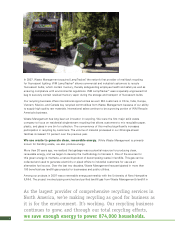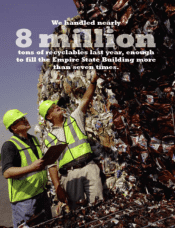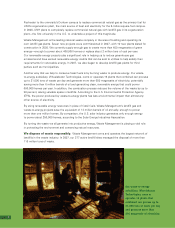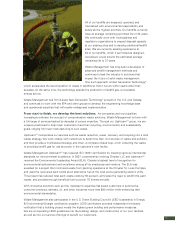Waste Management 2007 Annual Report Download - page 11
Download and view the complete annual report
Please find page 11 of the 2007 Waste Management annual report below. You can navigate through the pages in the report by either clicking on the pages listed below, or by using the keyword search tool below to find specific information within the annual report.
All of our landfills are designed, operated, and
maintained with environmental responsibility and
safety as the highest priorities. Our landfills currently
have an average remaining permitted life of 30 years.
We continually work with municipalities and
regulatory organizations to expand disposal capacity
at our existing sites and to develop additional landfill
sites. We are currently seeking expansions at
54 of our landfills, which if permitted as designed,
we believe would extend the estimated average
remaining life to 37 years.
Waste Management has long been a developer of
advanced landfill management methods and
continues to lead the industry in solutions that
impact the future of solid waste management.
One such approach is Next Generation Technology®
,
which accelerates the decomposition of waste in landfills so that it occurs within years rather than
decades. At the same time, the technology speeds the production of landfill gas, a renewable
energy source.
Waste Management has 10 full-scale Next Generation Technology®projects in the U.S. and Canada,
and continues to work with the EPA and other groups to develop the engineering knowledge base
and operational expertise that will enable widespread implementation.
From start to finish, we develop the best solutions. As companies and municipalities
increasingly embrace the concept of comprehensive waste solutions, Waste Management is there with
a full range of services backed by decades of proven expertise. Through our UpstreamSM group, we are
uniquely positioned to help major customers meet their recycling, environmental, and sustainability
goals, ranging from lean manufacturing to zero waste.
UpstreamSM incorporates our services such as waste reduction, reuse, recovery, and recycling into a total
waste strategy. We work closely with customers to determine their root sources of waste and pollution,
and then provide a multifaceted strategy and often, a complete closed loop—from collecting the waste
to providing landfill gas for use as power in the customer’s own facility.
Waste Management UpstreamSM has received ISO 14001 certification by meeting rigorous international
standards for environmental excellence. In 2007, a partnership involving Chrysler LLC and UpstreamSM
received the Environmental Leadership Award (ELA), Chrysler’s highest level of recognition for
environmental achievement and excellence among all its employees and vendors. The ELA was
awarded for a project that minimized waste from painting operations at the Chrysler St. Louis Complex
and used the recovered paint solids as an alternative fuel at the local power-generating electric utility.
This project has reduced total paint waste costs by 92 percent, eliminates the need to landfill this paint
waste, and provides enough beneficial fuel to power 70 homes annually.
With innovative solutions such as this, Upstream’s expertise has saved customers in automotive,
consumer products, defense, oil, and other industries more than $40 million while enhancing their
environmental stewardship.
Waste Management also participates in the U.S. Green Building Council’s LEED (Leadership in Energy
& Environmental Design) certification program. LEED certification provides independent third-party
verification that a building project meets the highest green building and performance measures.
We are incorporating LEED guidelines into the building, design, and construction of our own facilities
as well as into our service offerings to benefit our customers.
9

